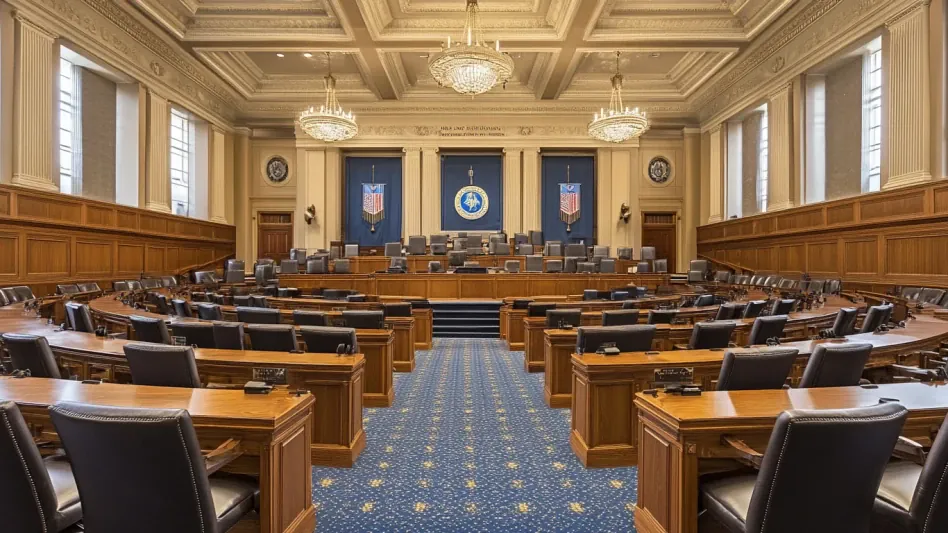Governor Sarah Huckabee Sanders has enacted a significant legislative effort by signing 46 new bills into law. These comprehensive pieces of legislation address myriad concerns within the state, encompassing areas such as lottery regulations, educational enhancements, healthcare improvements, and public safety measures. Each bill aims to bring tangible benefits to Arkansas residents, ensuring better governance and improved quality of life across multiple sectors.
Enhancing Public Welfare
Strengthening Lottery Regulations
In an effort to bolster transparency and trust in the state’s lottery system, Governor Sanders signed into law SB231. This bill extends law enforcement authority to certain employees within the Arkansas lottery system. The goal is to enhance oversight and reduce the possibility of unlawful activities associated with lottery operations. Increased regulation and monitoring are expected to help in preventing fraud and ensuring fair play, thereby reinstituting public confidence in the lottery. This move not only seeks to protect the integrity of the lottery but also ensures that the profits are directed toward their intended public benefits.
Furthermore, the extension of law enforcement powers to specific employees addresses the previous loophole that allowed certain unlawful activities to go unchecked. By implementing stricter oversight, SB231 is poised to act as a deterrent for illegal actions within the lottery framework. Enhanced regulatory measures across the board will contribute significantly to a more transparent and trustworthy lottery system and, ultimately, to better state revenue management, thereby benefiting public welfare programs funded by lottery proceeds.
Expanding Insurance Options
With the passage of SB276, Arkansas residents now have more choices when it comes to motor vehicle insurance. The bill permits surplus lines insurance as a valid form of coverage, thus widening the range of available options for consumers. This legislative change is particularly significant as it promotes a more competitive insurance market, which can lead to more tailored insurance solutions for consumers and potentially lower premiums.
Additionally, the enactment of HB1583 addresses the critical need for healthcare support for individuals with acquired brain injuries. This bill mandates that insurance policies include coverage for these conditions, ensuring that affected individuals receive the necessary medical care. By expanding insurance coverage to incorporate acquired brain injuries, HB1583 recognizes the importance of comprehensive healthcare provisioning. This mandate not only alleviates financial burdens on affected families but also emphasizes the state’s commitment to accessible healthcare for all its residents.
Improving Education Standards
Focusing on Student Health
One of the notable bills focusing on student welfare is HB1398, which mandates the implementation of a cardiac emergency response plan in schools. This legislation ensures that schools are well-prepared to handle cardiac emergencies by integrating nationally recognized response elements. The bill aims to prioritize student health and safety by preparing educational institutions for unforeseen medical scenarios, potentially saving lives.
Schools now must establish detailed response protocols, install necessary medical equipment, and train staff. The preparedness measures outlined in HB1398 ensure that schools can respond quickly and efficiently during cardiac emergencies, offering peace of mind to students, parents, and educators. Furthermore, this initiative speaks volumes about the state’s commitment to holistic student welfare, encompassing not only educational success but also physical health and safety.
Broadening Educational Opportunities
In an effort to make higher education more accessible, Governor Sanders signed HB1451, amending the Arkansas Concurrent Challenge Scholarship Program. This amendment redefines the criteria for student eligibility, opening the doors for more students to benefit from financial aid. By expanding the eligibility criteria, the scholarship program becomes more inclusive, enabling a broader spectrum of students to pursue higher education without the worry of prohibitive costs.
The adjusted criteria are particularly beneficial for students who might have previously been excluded from financial aid due to stringent prerequisites. This move encourages more students to apply for the scholarship, promoting academic aspirations beyond high school. HB1451 is a strategic step toward fostering a culture of learning and educational advancement within the state. Providing financial support to a larger number of students not only paves the way for personal success but also contributes to an educated workforce, which is crucial for the state’s long-term economic development.
Refining Healthcare Systems
Enhancing Autism Care
In addressing the unique healthcare needs of individuals with autism, HB1586 brings significant improvements to the Medicaid waiver for autism spectrum disorder. The bill specifies the number and qualifications of professionals authorized to diagnose autism, aiming to streamline the diagnostic process and improve the quality of care. By refining these criteria, HB1586 ensures that diagnoses are conducted by qualified professionals, leading to better outcomes for individuals on the autism spectrum.
The modification in HB1586 is expected to address previous inconsistencies and barriers in the diagnostic process, ensuring timely and accurate diagnosis, which is crucial for effective treatment and support. This legislation highlights the state’s commitment to supporting individuals with autism and their families by improving access to specialized care, thereby fostering an inclusive healthcare system that caters to the diverse needs of its residents.
Clarifying Commitment Criteria
HB1169, another crucial healthcare-related bill signed into law, clarifies the criteria for involuntary commitment due to a medical condition. This legislation is designed to ensure that the process respects individuals’ rights while addressing severe medical needs effectively. The clarified criteria offer a more transparent and fair process for involuntary commitment, balancing the necessity to provide care with the protection of individual liberties.
The implementation of HB1169 is particularly pertinent for ensuring that individuals requiring involuntary commitment receive the appropriate care without infringing on their rights. This balance between medical necessity and individual rights underscores the state’s dedication to ethical and effective healthcare practices. By refining these criteria, HB1169 aims to create a more just and compassionate healthcare system that prioritizes the well-being of its residents.
Protecting Public Safety
Addressing Human Trafficking
Human trafficking presents a grave concern, and in response, Governor Sanders signed HB1609 into law, introducing an enhanced penalty for recruiting trafficked persons. This legislation aims to deter human trafficking activities by establishing stricter punishments for those involved in this heinous crime. By amplifying the consequences, the state aims to send a strong message that human trafficking will not be tolerated, thereby offering better protection and justice for victims.
The stronger penalties outlined in HB1609 serve as a significant deterrent for traffickers, potentially reducing the prevalence of human trafficking within the state. Furthermore, this law highlights the commitment to protecting vulnerable individuals and supporting victims in their pursuit of justice. By addressing human trafficking with stringent measures, Arkansas takes a firm stance on ensuring the safety and dignity of its residents.
Promoting Safe Employment Practices
To foster safer workplace environments, HB1643 allows employers to disclose substantiated allegations of sexual abuse or harassment with written consent. This legislation promotes transparency and helps ensure that potential employers have access to relevant information about prospective employees. The aim is to create safer, more respectful work environments by equipping employers with the necessary knowledge to make informed hiring decisions.
Transparency in employment practices, as outlined in HB1643, is crucial for fostering trust and safety within the workplace. By allowing the disclosure of substantiated allegations, this bill helps prevent the recurrence of abuse and harassment, safeguarding employees’ well-being. The legislation underscores Arkansas’s dedication to upholding ethical employment practices and providing safe working conditions for all its residents.
Supporting Economic and Community Development
Facilitating Financial Access and Support
The enactment of HB1517, known as the Earned Wage Access Services Act, is a notable step in offering financial flexibility to employees. This legislation allows workers to access earned wages before their scheduled payday, providing a lifeline for those facing urgent financial needs. By facilitating access to earned wages, HB1517 offers a pragmatic solution for financial pressures, helping employees manage their finances more effectively and avoid costly short-term loans.
In addition to financial flexibility, SB304 ensures that registered voters who have changed counties can cast valid ballots, thereby promoting voter participation and electoral integrity. This legislative change addresses previous barriers to voting, ensuring that every eligible voter can exercise their right to vote, regardless of recent relocations. Both HB1517 and SB304 reflect a commitment to supporting the financial and democratic participation of Arkansans, fostering a more inclusive and responsive state.
Encouraging Rural and Job Development
Governor Sarah Huckabee Sanders has made a substantial legislative move by signing 46 new bills into law. These pieces of legislation are quite comprehensive and tackle a wide range of concerns within the state of Arkansas. They cover diverse areas such as lottery regulations, advancements in education, enhancements in healthcare, and measures for public safety.
The focus on lottery regulations aims to ensure that the system is fair and operates with integrity, potentially paving the way for increased revenue that could further benefit public services. On the educational front, the bills likely seek to improve school standards, student performance, and educational facilities, ultimately creating brighter futures for students across the state.
Improvements in healthcare aim to provide better access to medical services, enhance the quality of care available to all residents, and address potential public health issues more effectively. Public safety measures are designed to create a safer environment for all citizens, covering everything from law enforcement support to community safety programs.
Each of these 46 bills has a specific goal of bringing tangible benefits to the residents of Arkansas. By addressing these key areas, the legislation strives to ensure better governance and an overall improved quality of life for people in multiple sectors. Governor Sanders’ efforts represent a concerted push to progress and enhance various aspects of living for the state’s residents.









